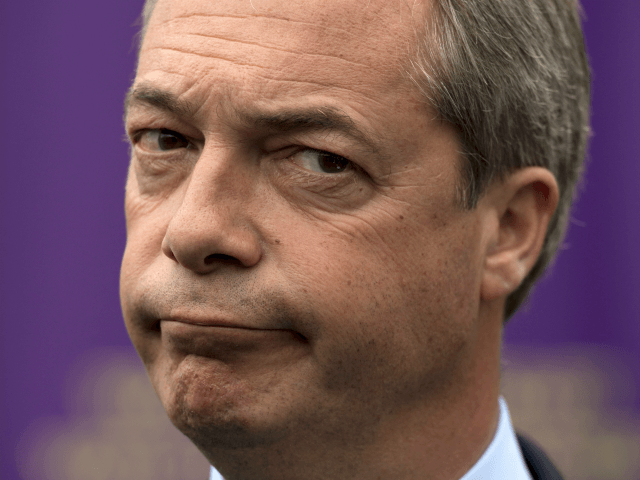The peoples of Western nations were quick to surrender their hard-won liberties to national governments in the early days of the coronavirus panic, but it may take years or decades to get them back, ‘Mr Brexit’ Nigel Farage has said.
Speaking to Breitbart News Network editor-in-chief Alex Marlow on the Breitbart News Daily show on Sirius XM Patriot, Brexit Party leader Nigel Farage told listeners of his serious concerns about the way the British public “under virtual house arrest” were being policed during the coronavirus lockdown, remarking that forces were becoming a “rule unto themselves”.
But most concerning, the Brexit pioneer said, was how the police’s theoretically temporary powers had been codified into law and could be retained long-term on flimsy pretexts. This, Mr Farage said, would be seriously detrimental to the British people.
Mr Farage said: “In times of crisis, governments take more power and citizens generally quite freely allow them to… The biggest ever expansion of the British government was in World War Two when the government had almost total power. In six months’ time when that legislation comes up for renewal, I can already see the argument being made: ‘ah, but we mustn’t take these powers away from the authorities in case we have another outbreak.’ That’s the problem.”
Noting that it was very easy and even reassuring to flock to the power of the state in times of crisis, this would be a course of action citizens with suddenly limited liberty could learn to repent later. Mr Farage continued: “Surrendering power to the state happens very quickly. It happens in times of crisis. Getting back those liberties and freedoms tends to be a battle that goes on for years or decades, so I am very worried about it.”
While it was important to get back to normality as soon as possible, it was important to do so wisely, and for now social distancing — although perhaps not necessarily enforced by an over-enthusiastic police force — remained important.
Citing European nation Austria as a source of inspiration, Mr Farage said: “Social distancing rules make sense… But I do think we have to find ways to allow some resumption of economic life without taking stupid risks.
“For example Austria… They started to ease last Tuesday. They are beginning to allow non-essential shops and businesses to open, but everyone has got to keep six feet away from each other and everybody has got to wear a face mask, and that’s the way we’ve got to start to move forwards.”
Nigel Farage Will Campaign to Quickly Retire ‘Police State’ Coronavirus Powers https://t.co/2tTqMp3O1e
— Breitbart London (@BreitbartLondon) April 15, 2020
Ending the lockdown in good time was important, Mr Farage said, but more important was that the cure did not become worse than the disease.
The remarks come as part of a new post-Brexit campaign for Mr Farage, having long argued against Britain’s membership of the European Union on a basis of fundamental liberties, and now expressing concern that the British state itself is becoming increasingly illiberal.
Speaking earlier in April, Mr Farage said when looking at the growing “police state” engendered by the coronavirus lockdown that he had found his “next campaign”, and that he would be agitating against the police’s newfound powers being retained in the long run. Breitbart London reported his remarks at the time when he said: “Yes, I do want to fight this horrible disease. Indeed, I was one of the first people to condemn publicly the Government’s herd immunity strategy.
“But I do not want to live under a house detention regime or for this country to be remoulded into a police state… I can envisage the argument being advanced by the police that many of their powers must be retained in case another pandemic strikes.”
Mr Farage’s own remarks followed others by eminent British jurist Lord Sumption, who recently retired from the UK’s Supreme Court. Expressing his own concerns in comments to the state broadcaster the BBC in March, he criticised the behaviour of some forces, remarking: “This is what a police state is like — it is a state in which the government can issue orders or express preferences with no legal authority, and the police enforce minister’s wishes.”
‘This is What a Police State is Like’: Ex-Supreme Court Justice Sounds Alarm on Lock down Overreach https://t.co/tbiGTlT5TR
— Breitbart London (@BreitbartLondon) April 1, 2020

COMMENTS
Please let us know if you're having issues with commenting.